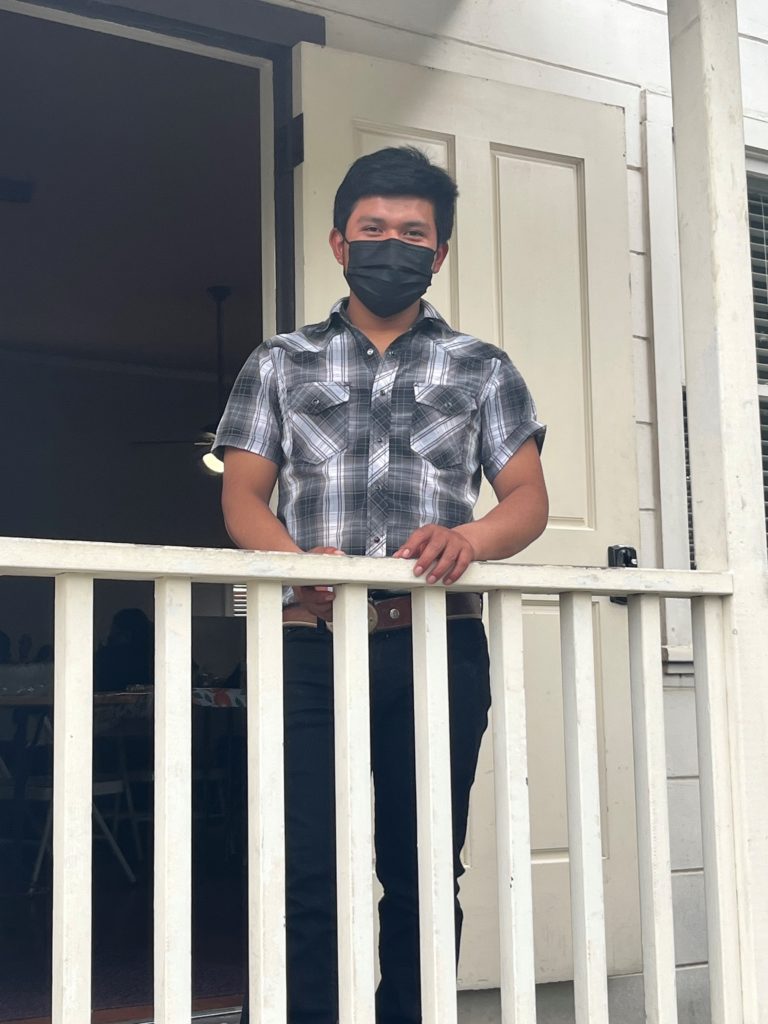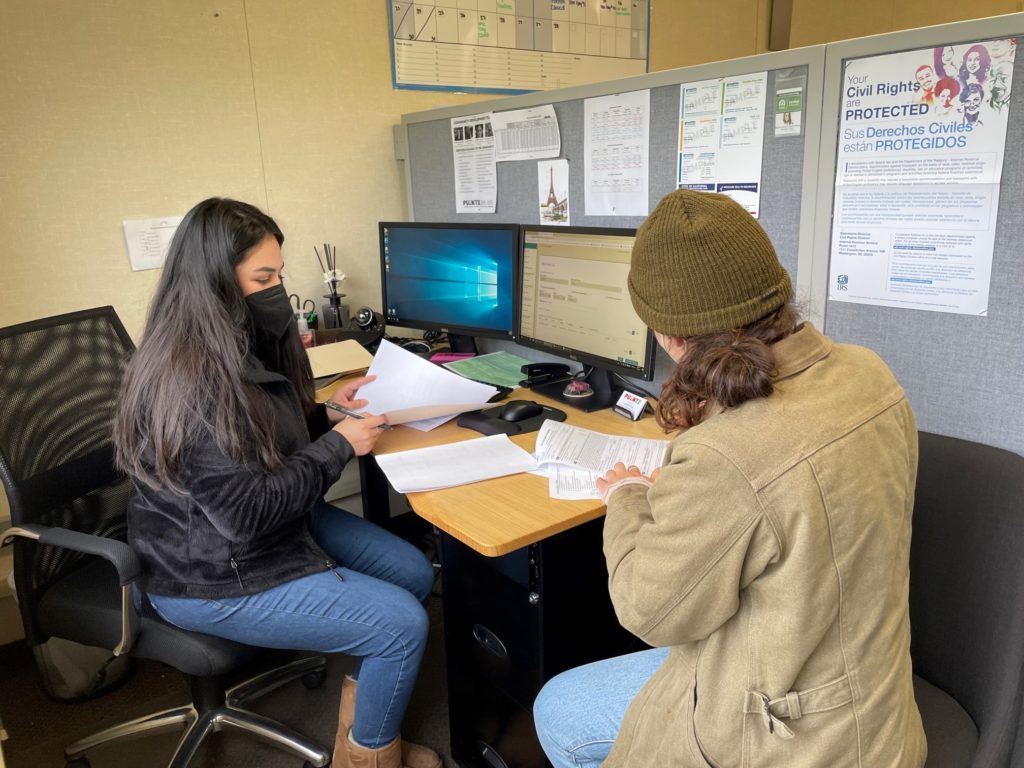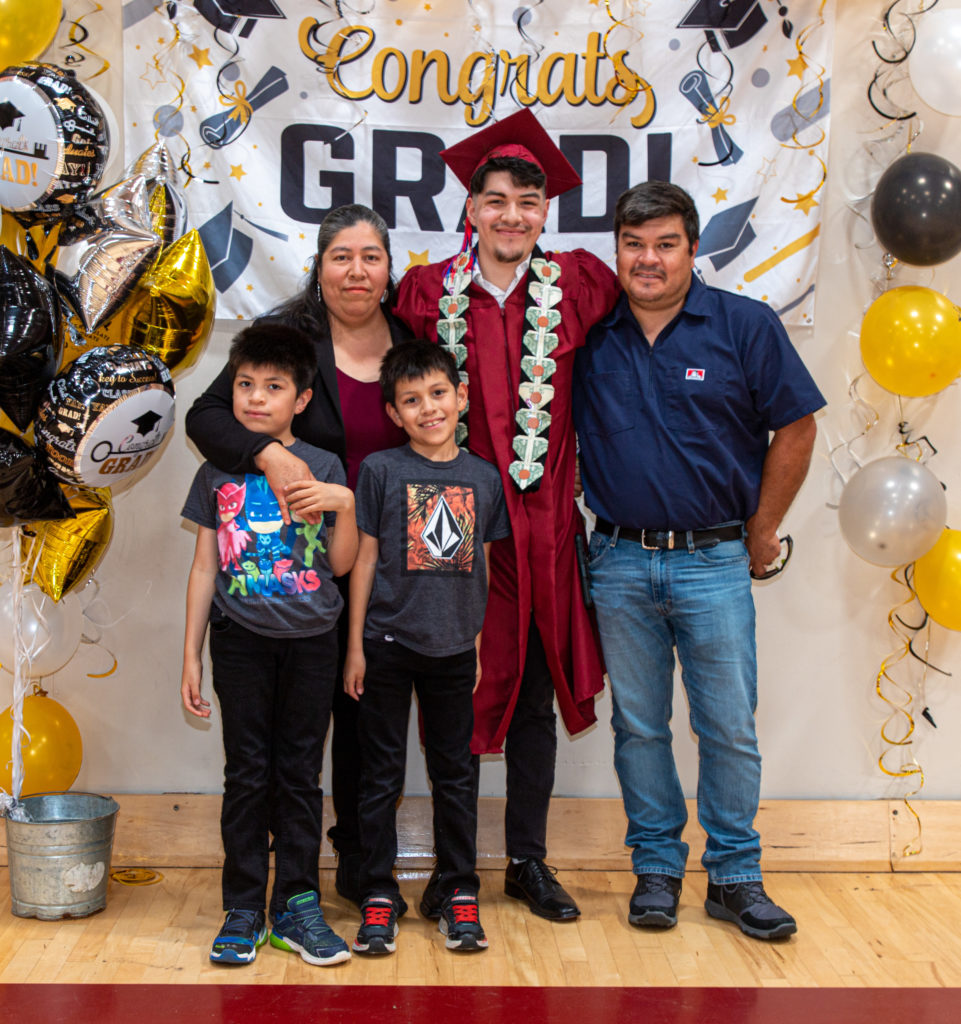
When Astor De Léon found an agricultural job in Pescadero after crossing over from Central America last year, he considered himself lucky. People were friendly and welcoming; he had his own bedroom in rented housing provided by his employer. The climate reminded him of his home region in Guatemala.
But there were some pretty obvious drawbacks, and one of them became clear every time it rained. “On those rainy days, I would get wet. Water would get in my shoes. And so it was depressing to feel so uncomfortable in those situations,” he says. (De Léon’s name has been changed).
‘Uncomfortable’ is an understatement when you hear him describe long, wet, cold days harvesting brussel sprouts and fava beans in the rain.
“I would get home at the end of the work day, wash my tennis shoes, and hang them upside down to dry. And then the next day I would wear them again. They were only halfway dry. And I think that would add to the feeling of depression, because that moment would come and I’d be like, ‘Why am I here? Why am I doing this work?’” says De Léon.
Agricultural employers are not strictly required to provide full rain gear to workers in their employment. The federal Occupational Safety and Health Administration does not specify standards for working in the rain, and Cal/OSHA labor laws are more focused on shade, water, rest and other safety concerns.
De Léon is, by far, not the only agricultural worker in this situation – locally or nationally. Fortunately, a recent grant from San Mateo County made it possible for Puente to distribute nearly 200 sets of rain jackets and rain boots to South Coast farmworkers who needed them.
The $50,000 grant came from Measure K funds that San Mateo county voters approved in 2016. Puente purchased and distributed the high-quality rain gear to workers this past March.
It all came about because the workers themselves advocated for it, according to Corina Rodriguez-Perez, Puente’s Community Development Director.
“We were approached by Supervisor Don Horsley after he had met with a group of farm workers from Pescadero,” she explains.
At the request from Don Horsley, Puente set up two meetings in 2021 and 2022 between agriculture workers and the staff of Supervisor Horsley’s office, which represents the unincorporated South Coast, part of District 3. It was an opportunity for workers to talk about their biggest concerns and ask for the county’s support. Three of the biggest issues that came up were the lack of affordable housing, raising minimum wages for farmworkers, and the need for decent work equipment like raincoats and rainboots.
“We all realize that housing is a bigger issue that won’t easily be solved. So the county decided to tackle what they could and demonstrate that they were making an effort to not just listen, but actually act on the words that they were hearing from the farm workers,” recalls Rodriguez-Perez. “It felt really good when we got that call from the county.”
It was just in time, too. For years, she’d observe workers in the fields without proper work equipment. And when she saw them around Puente, she would hear the stories about how they would “cope” without it.
“People usually had lower-quality boots that were more affordable. And so what was happening was that they would also wear double socks, because that first sock would still get wet from the little bit of water that would go through the boots,” she says.
And that’s not all.
“They would also double up on sweaters… So that when they finished for the day and went to get into their cars, they would take that top wet layer off and hopefully be dry underneath.”
These are the sorts of chronic issues that oblige farmworkers to invent workarounds. It takes a toll on farmworker health and morale. Living conditions and labor conditions are core to what farmworkers need and deserve. De Léon attended both community meetings with Supervisor Horsley and, in addition to rain gear,
But when it comes to the rain gear the county committed to, and delivered.
“Our bodies are “like precious objects. We’ve got to take care of them. And if we don’t, they start deteriorating,” says De Léon. “That’s what I think about when we’re not wearing the right clothes for the right weather. It just makes us feel uncomfortable, not wanting to be there, and unhappy with our work. But when we’re wearing all of those things, we do our jobs a little bit better. We’re protected against the wind or the rain.”
De Léon now owns a gray rain jacket, black rain boots, and brown rain pants. “I don’t have to worry about getting home and washing my tennis shoes to have them ready for the next day, or wearing wet shoes. I get home, clean them off, and hang up my jacket,” he says. “It just makes a big difference in what I’m doing and what I have to prepare for.”
For years, Puente has provided warm sweatshirts, blankets and socks to farm workers through regular donation drives and giveaways at La Sala and other events. And that will never change. But Rodriguez-Perez knows that at the heart of this story lies a specific moral dilemma: this was a temporary solution to a larger systemic problem that calls for more than a Band-Aid approach.
“We were on board to distribute these items and we were so grateful that there were these funds to be able to do this, but this was a one-time event,” she says. “The reality is we need to advocate for employers to provide what farm workers need in the field. Farmworkers should not have to pull money out of their already low paychecks to buy things that they need for the workplace.”
El equipo de lluvia destaca la abogacia liderada por los trabajadores agrícolas
Cuando Astor De Léon encontró un trabajo agrícola en Pescadero después de cruzar desde Centroamérica el año pasado, se consideró afortunado. La gente era amable y acogedora; tenía su propio dormitorio en una vivienda alquilada proporcionada por su empleador. El clima le recordaba a su región natal en Guatemala.
Pero hubo algunos inconvenientes bastante obvios, y uno de ellos se hizo evidente cada vez que llovía. “En esos días de lluvia, me mojaba. El agua se metería en mis zapatos. Y era deprimente sentirse tan incómodo en esas situaciones”, dice. (El nombre de De Léon ha sido cambiado).
“Incómodo” es un eufemismo cuando lo escuchas describir días largos, húmedos y fríos cosechando coles de bruselas y habas bajo la lluvia.
“Llegaba a casa al final de la jornada laboral, lavaba mis tenis y los colgaba boca abajo para que se secaran. Y luego, al día siguiente, los volvería a usar. Solo estaban medio secos. Y creo que eso aumentaría el sentimiento de depresión, porque llegaría ese momento y diría: ‘¿Por qué estoy aquí? ¿Por qué estoy haciendo este trabajo?’”, dice De Léon.
Los empleadores agrícolas no están estrictamente obligados a proporcionar ropa de lluvia completa a los trabajadores en su empleo. La Administración Federal de Salud y Seguridad Ocupacional no especifica estándares para trabajar bajo la lluvia, y las leyes laborales de Cal/OSHA se enfocan más en la sombra, el agua, el descanso y otras cuestiones de seguridad.
De Léon no es, con mucho, el único trabajador agrícola en esta situación, a nivel local o nacional. Afortunadamente, una subvención reciente del condado de San Mateo hizo posible que Puente distribuyera casi 200 juegos de impermeables y botas impermeables a los trabajadores agrícolas de la costa sur que los necesitaban.
La subvención de $50,000 provino de los fondos de la Medida K que los votantes del condado de San Mateo aprobaron en 2016. Puente compró y distribuyó ropa impermeable de alta calidad a los trabajadores en marzo pasado.
Todo sucedió porque los propios trabajadores lo abogaron, según Corina Rodríguez-Pérez, Directora de Desarrollo Comunitario de Puente.
“El supervisor Don Horsley se acercó a nosotros después de que se reunió con un grupo de trabajadores agrícolas de Pescadero”, explica.
A pedido de Don Horsley, Puente organizó dos reuniones en 2021 y 2022 entre trabajadores agrícolas y el personal de la oficina del supervisor Horsley, que representa a la costa sur no incorporada, parte del Distrito 3. Fue una oportunidad para que los trabajadores hablaran sobre su mayor inquietud y pidieran el apoyo del condado. Tres de los problemas más importantes que surgieron fueron la falta de viviendas asequibles, el aumento del salario mínimo para los trabajadores agrícolas y la necesidad de equipo de trabajo decente como impermeables y botas de lluvia.
“Todos nos damos cuenta de que la vivienda es un problema mayor que no se resolverá fácilmente. Así que el condado decidió abordar lo que pudo y demostrar que estaban haciendo un esfuerzo no solo para escuchar, sino para actuar de acuerdo con las palabras que escuchaban de los trabajadores agrícolas”, recuerda Rodríguez-Pérez. “Me sentí muy bien cuando recibimos esa llamada del condado”.
Fue justo a tiempo, también. Durante años, observó a los trabajadores en los campos sin el equipo de trabajo adecuado. Y cuando los veía alrededor de Puente, escuchaba las historias sobre cómo “se las arreglaron” sin él.
“La gente por lo general tenía botas de menor calidad que eran más asequibles. Entonces, lo que estaba pasando era que también usaban calcetines dobles, porque ese primer calcetín todavía se mojaba por la poca agua que pasaba por las botas”, dice ella.
Y eso no es todo.
“También duplicaban los suéteres… De modo que cuando terminaran el día y fueran a subirse a sus autos, se quitarían la capa húmeda superior y, con suerte, estarían secos por debajo”.
Estos son los tipos de problemas crónicos que obligan a los trabajadores agrícolas a inventar soluciones alternativas. Tiene un costo en la salud y la moral de los trabajadores agrícolas. Las condiciones de vida y laborales son fundamentales para lo que los trabajadores agrícolas necesitan y merecen. De Léon asistió a ambas reuniones comunitarias con el supervisor Horsley y, además del equipo de lluvia,
Pero cuando se trata del equipo de lluvia, el condado se comprometió y cumplió.
“Nuestros cuerpos son “como objetos preciosos. Tenemos que cuidarlos. Y si no lo hacemos, empiezan a deteriorarse”, dice De Léon. “Eso es lo que pienso cuando no usamos la ropa adecuada para el clima adecuado. Simplemente nos hace sentir incómodos, sin querer estar allí y descontentos con nuestro trabajo. Pero cuando usamos todas esas cosas, hacemos nuestro trabajo un poco mejor. Estamos protegidos contra el viento o la lluvia”.
De Léon ahora posee una chaqueta impermeable gris, botas impermeables negras y pantalones impermeables color marrón. “No tengo que preocuparme por llegar a casa y lavar mis tenis para tenerlos listos para el día siguiente, o por usar zapatos mojados. Llego a casa, me los limpio y cuelgo mi chaqueta”, dice. “Simplemente hace una gran diferencia en lo que estoy haciendo y para lo que tengo que prepararme”.
Durante años, Puente ha brindado sudaderas, mantas y calcetines abrigados a los trabajadores agrícolas a través de campañas regulares de donación y obsequios en La Sala y otros eventos. Y eso nunca cambiará. Pero Rodríguez-Pérez sabe que en el centro de esta historia se encuentra un dilema moral específico: esta fue una solución temporal a un problema sistémico más amplio que requiere más que un enfoque de curita.
“Estábamos a bordo para distribuir estos artículos y estábamos muy agradecidos de que hubiera estos fondos para poder hacer esto, pero este fue un evento único”, dice ella. “La realidad es que debemos abogar por que los empleadores proporcionen lo que los trabajadores agrícolas necesitan en el campo. Los trabajadores agrícolas no deberían tener que sacar dinero de sus cheques de pago ya bajos para comprar cosas que necesitan para el lugar de trabajo”.




